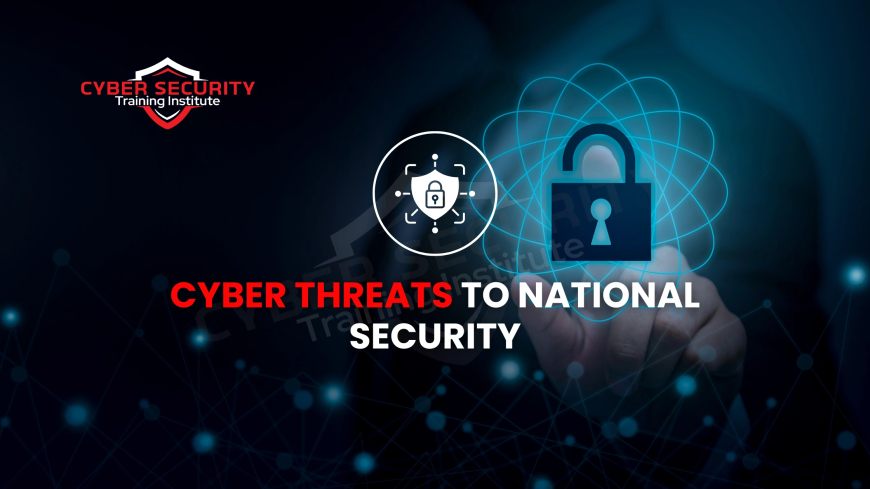How Does Cybersecurity Affect National Security?
In an era where technology underpins nearly every aspect of modern life, cybersecurity has emerged as a cornerstone of national security. From protecting critical infrastructure to safeguarding sensitive government data, the ability to defend against cyber threats is vital for a nation’s stability and safety. A single cyberattack can disrupt economies, compromise defense systems, or erode public trust. This blog post explores how cybersecurity directly impacts national security, diving into its role, real-world examples, challenges, and future implications. Written in a clear and approachable way, this guide aims to help everyone—from beginners to policymakers—understand this critical connection.

Table of Contents
- What Is Cybersecurity and Why Does It Matter?
- The Link Between Cybersecurity and National Security
- Key Areas Where Cybersecurity Impacts National Security
- Real-World Examples of Cybersecurity Threats
- Challenges in Strengthening Cybersecurity for National Security
- The Future of Cybersecurity in National Security
- Conclusion
- Frequently Asked Questions
What Is Cybersecurity and Why Does It Matter?
Cybersecurity refers to the practices, technologies, and processes designed to protect digital systems—such as computers, networks, and data—from unauthorized access, attacks, or damage. In simple terms, it’s about keeping the digital world safe, much like locking your house to prevent break-ins. Cybersecurity matters because our lives are increasingly digital: governments, businesses, and individuals rely on technology for communication, finance, healthcare, and more.
When it comes to national security, cybersecurity is critical because nations depend on digital systems to function. A breach in these systems can lead to catastrophic consequences, from leaking classified information to disrupting essential services like power grids or military operations. Understanding this connection is key to appreciating why cybersecurity is a top priority for governments worldwide.
The Link Between Cybersecurity and National Security
National security encompasses a nation’s ability to protect its citizens, economy, and infrastructure from internal and external threats. Cybersecurity is a vital component because:
- Protecting Critical Infrastructure: Power plants, water systems, and transportation networks rely on digital controls that are vulnerable to cyberattacks.
- Safeguarding Defense Systems: Military operations use interconnected systems for communication, surveillance, and weaponry, all of which need protection.
- Preventing Economic Disruption: Cyberattacks on financial institutions or supply chains can destabilize economies.
- Maintaining Public Trust: Breaches of government data, like citizen records, can erode confidence in leadership.
- Countering Espionage: Nations face cyber espionage from adversaries seeking to steal sensitive information.
In short, a nation’s strength depends on its ability to secure its digital assets, making cybersecurity inseparable from national security.
Key Areas Where Cybersecurity Impacts National Security
Cybersecurity affects national security in several critical areas. The table below outlines some of these areas, their importance, and the risks they face.
| Area | Importance | Potential Cyber Threats |
|---|---|---|
| Critical Infrastructure | Supports essential services like electricity, water, and transportation. | Ransomware, malware, or DDoS attacks disrupting services. |
| Military Systems | Enables defense operations, including communication and weapon systems. | Hacking or espionage to steal plans or disable systems. |
| Government Databases | Stores sensitive citizen and national data. | Data breaches exposing personal or classified information. |
| Economic Systems | Drives financial stability through banks and markets. | Cybertheft or attacks disrupting financial transactions. |
Each of these areas shows how deeply cybersecurity is woven into the fabric of national security, protecting everything from daily utilities to military readiness.
Real-World Examples of Cybersecurity Threats
Cybersecurity failures can have profound national security implications. Here are some notable examples:
- Colonial Pipeline Ransomware Attack (2021): A ransomware attack on a major U.S. fuel pipeline disrupted fuel supplies, causing shortages and economic panic. This highlighted vulnerabilities in critical infrastructure.
- SolarWinds Hack (2020): A sophisticated cyberattack compromised U.S. government agencies and private companies, exposing sensitive data and raising concerns about national defense.
- Stuxnet Worm (2010): This malware targeted Iran’s nuclear facilities, showing how cyberattacks can be used as weapons against a nation’s strategic assets.
- WannaCry Attack (2017): A global ransomware attack affected hospitals, businesses, and governments, demonstrating how cyber threats can disrupt essential services.
These incidents underscore the need for robust cybersecurity to prevent disruptions that threaten national stability.
Challenges in Strengthening Cybersecurity for National Security
While cybersecurity is crucial, nations face several hurdles in implementing effective protections:
- Evolving Threats: Cybercriminals and state-sponsored hackers constantly develop new techniques, outpacing traditional defenses.
- Lack of Coordination: Governments, private sectors, and international partners often struggle to collaborate effectively.
- Resource Constraints: Investing in cybersecurity requires significant funding and skilled professionals, which some nations lack.
- Legacy Systems: Outdated technology in government and infrastructure systems is vulnerable to modern attacks.
- Balancing Privacy and Security: Strong cybersecurity measures, like surveillance, can conflict with citizens’ privacy rights.
Addressing these challenges requires innovation, investment, and global cooperation to stay ahead of cyber threats.
The Future of Cybersecurity in National Security
As technology evolves, so will the role of cybersecurity in national security. Key trends include:
- Artificial Intelligence (AI): AI can detect and respond to threats faster than humans, improving defense mechanisms.
- Quantum Computing: While promising, quantum computing could break current encryption, necessitating new cybersecurity protocols.
- International Collaboration: Nations are forming alliances to combat cybercrime, sharing intelligence and resources.
- Cyber Warfare Strategies: Governments are developing offensive and defensive cyber capabilities as part of military strategy.
The future will demand proactive measures to protect nations from increasingly sophisticated cyber threats.
Conclusion
Cybersecurity is no longer just an IT concern—it’s a critical pillar of national security. From protecting critical infrastructure to preventing economic and military disruptions, robust cybersecurity ensures a nation’s safety and stability. Real-world attacks like Colonial Pipeline and SolarWinds highlight the stakes, while challenges like evolving threats and resource limitations show the work ahead. As technology advances, so must our cybersecurity strategies, incorporating AI, international cooperation, and innovative defenses. By prioritizing cybersecurity, nations can safeguard their citizens, economies, and futures in an interconnected world.
Frequently Asked Questions
What is cybersecurity?
Cybersecurity involves protecting digital systems, like computers and networks, from attacks, unauthorized access, or damage.
How does cyber security relate to national security?
Cybersecurity protects critical infrastructure, defense systems, and government data, all of which are essential for a nation’s safety and stability.
What is critical infrastructure?
Critical infrastructure includes essential systems like power grids, water supplies, and transportation networks that a nation relies on.
Can cyberattacks disrupt a nation’s economy?
Yes, attacks on financial institutions or supply chains can cause economic losses and disrupt markets.
What is a ransomware attack?
Ransomware is malware that locks a system or data until a ransom is paid, often disrupting critical services.
How do cyberattacks threaten military systems?
Cyberattacks can disable communication networks, steal defense plans, or interfere with weapon systems.
What was the SolarWinds hack?
The SolarWinds hack (2020) was a cyberattack that compromised U.S. government agencies and companies by exploiting software vulnerabilities.
Can cyber security protect against espionage?
Yes, strong cybersecurity measures like encryption can prevent adversaries from stealing sensitive information.
What is a DDoS attack?
A Distributed Denial of Service (DDoS) attack floods a system with traffic to overwhelm and disable it.
How does cyber security affect public trust?
Data breaches or government hacks can erode confidence in institutions, impacting national stability.
Why is international collaboration important for cybersecurity?
Cyber threats cross borders, so nations must share intelligence and resources to combat them effectively.
What role does AI play in cybersecurity?
AI can detect threats, analyze patterns, and respond to attacks faster than traditional methods.
Are legacy systems a cybersecurity risk?
Yes, outdated technology is vulnerable to modern attacks, posing risks to national security.
How does quantum computing affect cybersecurity?
Quantum computing could break current encryption, requiring new cybersecurity protocols to protect data.
Can cyber security measures infringe on privacy?
Yes, measures like surveillance can conflict with privacy rights, requiring a balance between security and freedom.
What is cyber warfare?
Cyber warfare involves using cyberattacks to disrupt or damage a nation’s infrastructure, economy, or military.
How can governments improve cybersecurity?
Governments can invest in technology, train professionals, update systems, and collaborate globally.
Are private companies involved in national cybersecurity?
Yes, private companies manage critical infrastructure and partner with governments to enhance cybersecurity.
What is the role of encryption in cybersecurity?
Encryption scrambles data to make it unreadable without a key, protecting it from unauthorized access.
How will cybersecurity shape national security in the future?
Advancements in AI, quantum-resistant encryption, and global cooperation will strengthen defenses against evolving cyber threats.
What's Your Reaction?
 Like
0
Like
0
 Dislike
0
Dislike
0
 Love
0
Love
0
 Funny
0
Funny
0
 Angry
0
Angry
0
 Sad
0
Sad
0
 Wow
0
Wow
0

















